| Srl | Item |
| 1 |
ID:
084670
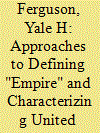

|
|
|
|
|
| Publication |
2008.
|
| Summary/Abstract |
The militant unilateralism of the George W. Bush administration has revived interest in such closely related and contested terms as "superpower,""hegemon,""empire," and "imperialism." This article identifies four different but somewhat overlapping approaches to defining "empire": ideal type, self-consciously empirical, constructivist, and overtly normative. The author's personal view is that any notion of American Empire or indeed U.S. hegemony or even superpower is profoundly misleading. Although the United States still ranks high on the scale of most traditional realist power factors, United States capabilities appear to be gravely waning today and its exercise of both hard and soft power has recently been so inept as to limit its current influence and possibly future role in global politics.
|
|
|
|
|
|
|
|
|
|
|
|
|
|
|
|
| 2 |
ID:
143486
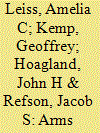

|
|
|
|
|
| Publication |
Cambridge, Center for International Studies, 1970.
|
| Description |
xi, 481p.pbk
|
| Contents |
Vol. III: Arms control and local conflict
|
|
|
|
|
|
|
|
|
|
|
|
Copies: C:1/I:0,R:0,Q:0
Circulation
| Accession# | Call# | Current Location | Status | Policy | Location |
| 022709 | 355.0320973/LEI 022709 | Main | On Shelf | General | |
|
|
|
|
| 3 |
ID:
104608
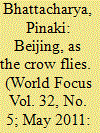

|
|
|
| 4 |
ID:
102016
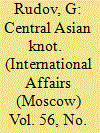

|
|
|
|
|
| Publication |
2010.
|
| Summary/Abstract |
THROUGHOUT ITS HISTORY, Russia has been geopolitically and geostrategically bound to Central Asia. Our ancestors understood this very well and regarded the Asian underbelly as the Russian Empire's buffer in the southeast. During Soviet times, this region turned from an important entity of foreign political interests into an integral part of the superpower.
|
|
|
|
|
|
|
|
|
|
|
|
|
|
|
|
| 5 |
ID:
088472
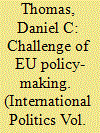

|
|
|
|
|
| Publication |
2009.
|
| Summary/Abstract |
This paper presents the special issue as a systematic attempt to understand why and when Member States succeed or fail in negotiating common policies for the world stage. It highlights the European Union's (EU's) lack of automatic unity in world affairs, and focuses on the process by which Member States negotiate their differences in the quest for common policies. The subject and conclusions of the various case studies are presented
|
|
|
|
|
|
|
|
|
|
|
|
|
|
|
|
| 6 |
ID:
089036
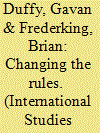

|
|
|
|
|
| Publication |
2009.
|
| Summary/Abstract |
Constructivists often refer to the end of the Cold War to illustrate their contention that social rules are not immutable. Agents can change the rules by performing actions that undermine them. In this article, we describe the Cold War as a set of social rules sustained by superpower speech acts. We show that, by altering their behavior, the superpowers undermined the felicity of these rules. In so doing, they progressively dismantled the rules of the Cold War. Our model captures the competing arguments in the ongoing debate about whether the rationalist buildup argument or the constructivist new thinking argument better explains the end of the Cold War. Within the model, we identify the rules that, when made infelicitous by the superpowers, resolves tensions in the Cold War rule system in ways consistent with each argument. We conclude by showing how these competing arguments are reflected in contemporary debates concerning the nature of the global security rules emerging in the post-cold-war world.
|
|
|
|
|
|
|
|
|
|
|
|
|
|
|
|
| 7 |
ID:
100240
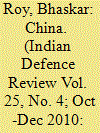

|
|
|
| 8 |
ID:
140246
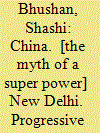

|
|
|
|
|
| Publication |
New Delhi, Progressive People's Sector Publications (p) Ltd., 1976.
|
| Description |
216p.hbk
|
|
|
|
|
|
|
|
|
|
|
|
Copies: C:1/I:0,R:0,Q:0
Circulation
| Accession# | Call# | Current Location | Status | Policy | Location |
| 029472 | 951.058/SHA 029472 | Main | On Shelf | General | |
|
|
|
|
| 9 |
ID:
146484
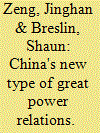

|
|
|
|
|
| Contents |
The rise of China has been reshaping how the country sees its own role in the world. China has become increasingly willing to move from being a norm and system taker to a norm and system shaper (if not yet maker). One example is Xi Jinping's promotion of ‘a new type of Great Power relations’ designed to create a strategic space in which to operate. By using a mixed quantitative/qualitative analysis, we analyse 141 Chinese articles titled with ‘new type of Great Power relations’. We find that although Chinese analysts and policy makers rejected the idea of a G2 in 2009, the mainstream discourse has rapidly shifted to what we call a ‘G2 with Chinese characteristics’ which indicates a fundamental shift in Chinese evaluation of the power status of itself and others. While some Chinese scholars consider China to have already achieved the status as the world's No. 2 or even a superpower, the mainstream discourse views China as both a Great Power and a rising power at the same time. This, we argue, moderates the expectations of what China can and should do to resolve global problems despite its great power status.
|
|
|
|
|
|
|
|
|
|
|
|
|
|
|
|
| 10 |
ID:
126402
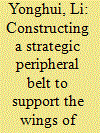

|
|
|
| 11 |
ID:
184864
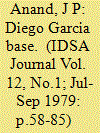

|
|
|
| 12 |
ID:
185322
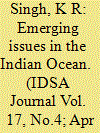

|
|
|
| 13 |
ID:
155432
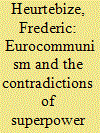

|
|
|
|
|
| Summary/Abstract |
This article argues that Eurocommunism was an unwanted consequence of détente. By relaxing tensions between the superpowers, détente allayed fears of a communist threat in Western Europe and gave communist parties more leeway to choose a semi-independent course that nearly brought them to power in Italy and France.
|
|
|
|
|
|
|
|
|
|
|
|
|
|
|
|
| 14 |
ID:
124816
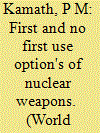

|
|
|
|
|
| Publication |
2013.
|
| Summary/Abstract |
According to PM Kamath, the US as the sole superpower today is unlikely to face a nuclear threat from any other country. Hence as a republic committed to promoting democracy globally, it must embrace the no first use option as tis policy on nuclear weapons to that more nations may be motivated to adopt it. No first use is a far more democratic doctrine than the option of first use and could also be the first step toward global nuclear disarmament.
|
|
|
|
|
|
|
|
|
|
|
|
|
|
|
|
| 15 |
ID:
125012
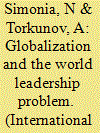

|
|
|
|
|
| Publication |
2013.
|
| Summary/Abstract |
THE BIPOLAR SYSTEM of international relations tumbled down unexpectedly leaving behind at least two consequential factors which for a long time remained ignored and/or deliberately pushed aside by many international players. First, the world no longer needed any state with a status of superpower, a product of ideological confrontation of two systems (two camps, in the Cold War parlance). Second, the trend toward a multipolar world (which had appeared and had been developing for some time behind the screen of bipolarity) became obvious. Still gaining strength (the process will take more than one decade to be completed) it ran into a wall of skepticism. For a long time, skeptics of all hues refused to recognize the obvious and piled one argument on another in an effort to disprove what they called the concept of multipolarity. Truth be said, this is not a concept - this is reality which explains why the American idea of unipolarity picked up by its supporters in other countries (Russia among them) promptly went out of fashion. Revived bipolarity came into vogue together with the global crisis and expectations that China's rapidly growing economy which responded to the world crisis by a slight drop of GDP (from 10% to 7.58%) and its rapidly mounting military might will make it one of the poles instead of the Soviet Union. There is a lot of talk about a "new type of capitalism" that challenges the Western capitalist countries and that outstrips them one after another. Having pushed Japan from its second place in world economy China is pushing forward toward America's first place. The larger part of expert community, including experts of the UN and other international organizations, is convinced that this is merely a matter of time. This is another myth with no serious or solid scientific foundation: superficial and formal comparison of statistics (GDP or even per capita GDP) which implies that the world is uniform cannot be taken for the starting point.
|
|
|
|
|
|
|
|
|
|
|
|
|
|
|
|
| 16 |
ID:
064218
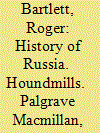

|
|
|
|
|
| Publication |
Houndmills, Palgrave Macmillan, 2005.
|
| Description |
xii, 321p.Pbk
|
| Standard Number |
0333632648
|
|
|
|
|
|
|
|
|
|
|
|
Copies: C:1/I:0,R:0,Q:0
Circulation
| Accession# | Call# | Current Location | Status | Policy | Location |
| 049805 | 947/BAR 049805 | Main | On Shelf | General | |
|
|
|
|
| 17 |
ID:
029084
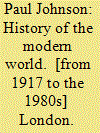

|
|
|
|
|
| Publication |
London, WeidenFeld and Nicolson, 1983.
|
| Description |
vii, 817p.Hbk
|
| Standard Number |
0297782266
|
|
|
|
|
|
|
|
|
|
|
|
Copies: C:1/I:0,R:0,Q:0
Circulation
| Accession# | Call# | Current Location | Status | Policy | Location |
| 021907 | 909.82/JOH 021907 | Main | On Shelf | General | |
|
|
|
|
| 18 |
ID:
133569
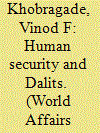

|
|
|
|
|
| Publication |
2014.
|
| Summary/Abstract |
Human security does not consist only of military defence, but rather focuses on the protection and well-being of human life and dignity. Vinod F Khobragade elucidates the context of human security in India in general and amongst Dalits in particular. He also questions India's credibility as a potential superpower given its poor performance on social indicators.
|
|
|
|
|
|
|
|
|
|
|
|
|
|
|
|
| 19 |
ID:
104034
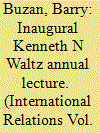

|
|
|
|
|
| Publication |
2011.
|
| Summary/Abstract |
The category of superpower, as distinct from great power, has become naturalized in the discourses about international relations. But 'superpower' has only become common usage since the end of the Second World War and in modern history cannot meaningfully be applied much further than the 19th century. This article argues that superpowers are a historically contingent phenomenon whose emergence rested on the huge inequality of power between the West and the rest of the world that developed during the 19th century. As this inequality diminishes, the most likely scenario for world politics is decentred globalism, in which there will be no superpowers, only great powers. The largest section of the article uses a framework of material and social factors to show why the US is unlikely to remain a superpower, and why China and the EU are unlikely to become superpowers. The following three sections use the same framework to look more briefly at why a world with only great powers is likely to take a more regionalized form; why this might produce a quite workable, decentralized, coexistence international society with some elements of cooperation; and what the possible downsides of a more regionalized international order might be, focusing particularly on the problem of regional hegemony. The conclusions offer five policy prescriptions for living in a decentred globalist world.
|
|
|
|
|
|
|
|
|
|
|
|
|
|
|
|
| 20 |
ID:
118713
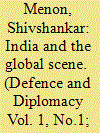

|
|
|